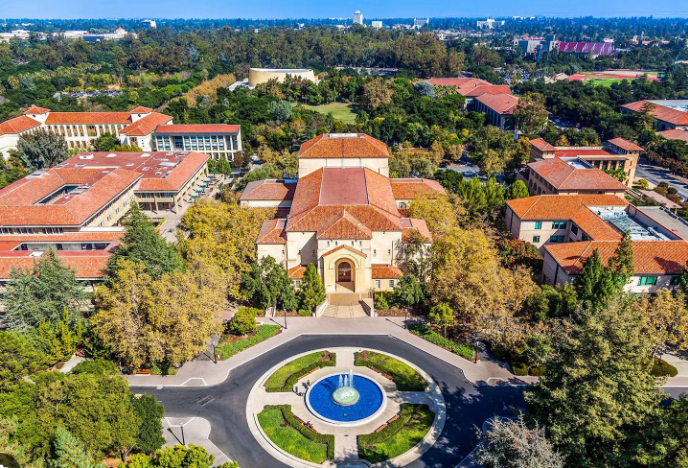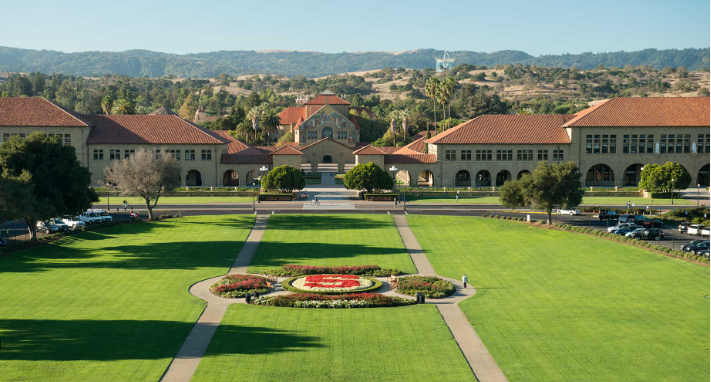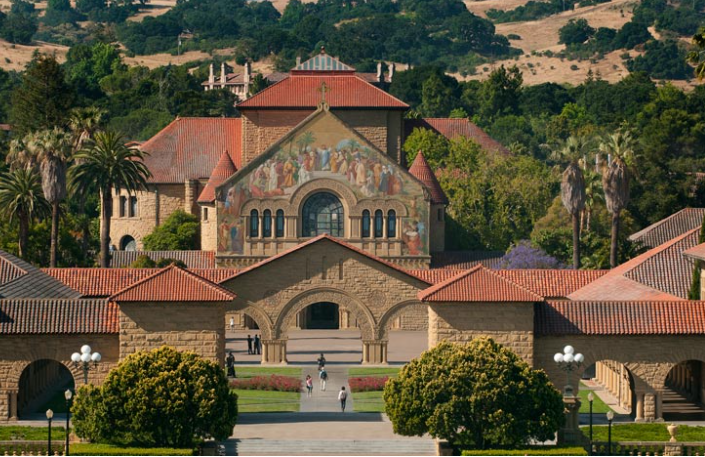According to reports, a Stanford University instructor called Jewish pupils “colonizers” and minimized the Holocaust. They have been removed from the classroom.
Stanford University : In recent times, academia has been the focal point of numerous controversies, but perhaps none as shocking as the incident involving a Stanford University instructor who was suspended for making inflammatory remarks about Jewish pupils, equating them with “colonizers” and downplaying the Holocaust. This unfortunate episode not only raises concerns about the sanctity of academic discourse but also underscores the pressing need for responsible and sensitive conversations within our educational institutions.

The Shocking Incident Of Stanford University
Stanford University : An instructor at Stanford University has been fired while the university looks into claims that, during a debate on the conflict between Israel and Hamas, the instructor minimized the Holocaust and singled out students “based on their backgrounds and identities.”
“Without passing judgment on the situation, this story is very concerning. The targeting of students based on their identities is prohibited by academic freedom, Stanford stated in a statement on Wednesday.
The statement stated, “The instructor in this course is not currently teaching while the university attempts to ascertain the facts of the situation.” The name of the instructor, who is not a member of the faculty, remains unknown.
Stanford University : The university’s move comes as tensions outside of the Middle East have grown as a result of this week’s violent fighting in Gaza between Israel and militants of the Hamas movement.
Jews in the US claim they worry about being targeted as the nation deals with numerous reports of antisemitism. The Anti-Defamation League, which keeps track of antisemitic occurrences, reported around 3,700 in the US last year, which is the most since the organization started keeping track in 1979.

Stanford University : The controversy began when an instructor at Stanford University, during a class discussion, allegedly referred to Jewish students as “colonizers.” This deeply offensive and inappropriate statement, aimed at a particular group of students, understandably sparked outrage and condemnation within the academic community and beyond.
To make matters worse, the same instructor was reported to have minimized the Holocaust, one of the most tragic and well-documented events in human history. This grave insensitivity to the suffering and loss of millions during the Holocaust added fuel to an already raging fire of public anger and disbelief.
According to Rabbi Dov Greenberg
Stanford University : The executive director of Rohr Chabad House, Stanford’s Jewish community center, Rabbi Dov Greenberg, told that the students were “shaken up.”
According to Greenberg, who claimed to have spoken with the students involved, they are “not doing well” and fear reprisal or bullying on campus.
Greenberg claims that the pupils claimed the instructor attempted to defend the conduct of Hamas and queried the number of Jews who perished during the Holocaust.

The teacher stated that more people have been slaughtered by colonists when one kid responded, “6 million,” and added, “Israel is a colonizer.”
The teacher then asked a few pupils to physically move to the rear of the classroom to further illustrate his point. The teacher reportedly added, “That’s what Israel does to Palestinians,” according to Greenberg.
According to Greenberg, that was the key interchange that caused students to feel excluded, under assault, and alone.
Stanford University : The pupils who spoke with Greenberg at the time did not object to the teacher. “The pupils made it very plain to me that they were traumatized and afraid. They were unable to comprehend what was happening to them, according to Greenberg.
The college freshman, who were away from home for the first time, were described by Greenberg as a “classic case of young students feeling traumatized.” They didn’t think they were prepared to debate a Stanford professor at the moment. They are only children.
The claimed remarks by the Stanford professor were made during two classes on Tuesday with a total of 18 pupils, when the professor declared the day’s lesson will center on colonialism, according to the San Francisco Chronicle. Jewish student leaders who met with students in College 101, a course that first-year students must take, were noted by the publication.

According to Students
Stanford University : The students told Stanford Israel Association co-presidents Nourya Cohen and Andrei Mandelshtam that the instructor asked Jewish students to raise their hands, segregated those students from their belongings, and claimed that they were imitating what Jews were doing to Palestinians, according to the Chronicle. According to the Chronicle, the students Cohen and Mandelshtam spoke with requested anonymity.
Students claimed to Cohen and Mandelshtam that the instructor brought up Belgium’s King Leopold II’s 19th-century colonialism of the Congo and said that more people were slaughtered there than during the Holocaust and that Israel had colonized Palestinians, according to the Chronicle.
According to students from both sessions, the instructor referred to them as “colonizers” or “colonized” after asking them where their ancestors came from, according to the Chronicle.

By The Cohen
Cohen told the newspaper, “I feel totally dehumanized that someone in charge of pupils and developing minds could possibly try and rationalize the slaughter of my people. “I feel like I’m reliving the Nazis’ defense on a college campus today, 80 years ago.”
The lecturer allegedly made the remarks months after the hate crime investigation into an anti-Semitic artwork found on a whiteboard attached to a Jewish student’s dorm room door at Stanford University was launched.
The N-word, several swastikas, and the letters “KKK” were also etched into a metal panel in a campus bathroom in February, according to the university.
“We have received numerous reports of worries about student safety. Jewish academics, staff, and students have expressed concern to us over the anti-Semitism that is on the rise. In a statement released on Wednesday, Stanford said: “We have heard from Palestinian students who have received threatening emails and phone calls. We want it to be known that Stanford is categorically opposed to hatred on the grounds of race, religion, nationality, national origin, and other factors.

The Consequences
Stanford University : In response to the uproar, Stanford University took swift action by suspending the instructor, pending a thorough investigation into the matter. The institution’s commitment to upholding academic integrity and fostering an inclusive environment was evident in this decision. Stanford emphasized that such comments and attitudes have no place within the institution’s values and principles.
While the instructor’s suspension was a significant step toward addressing the issue, it also prompted broader discussions about the responsibilities and limitations of academic freedom. Freedom of speech and expression are fundamental rights, but they come with the responsibility to engage in respectful and constructive dialogue.
The Importance of Inclusive Education
Stanford University : This incident serves as a stark reminder of the importance of inclusive education. Educational institutions, particularly universities, are meant to be spaces where diverse perspectives are not only tolerated but encouraged. They should be environments where students of all backgrounds feel safe and valued, and where they can engage in meaningful discourse without fear of discrimination or harm.
Inclusivity in education is not just a moral imperative; it is also vital for the intellectual and personal growth of students. Exposure to a variety of viewpoints and experiences enriches the learning process, fosters empathy, and prepares students to be global citizens who can navigate an increasingly diverse world.

Promoting Dialogue and Understanding
In the aftermath of this troubling incident, it is essential for Stanford University, and indeed all educational institutions, to take proactive measures to promote dialogue and understanding among students. One way to achieve this is through the following initiatives:
- Diversity and Inclusion Programs: Implement comprehensive diversity and inclusion programs that educate both students and faculty about the importance of respecting and valuing differences.
- Open Forums and Discussions: Organize open forums and discussions where students can share their experiences and perspectives in a safe and respectful environment.
- Cultural Sensitivity Training: Offer training sessions on cultural sensitivity and awareness to ensure that all members of the academic community are well-informed about potential sources of offense.
- Zero Tolerance for Discrimination: Establish clear policies against discrimination and hate speech, with consequences for those who violate these policies.

The Way Forward
Stanford University : The incident at Stanford University should serve as a wake-up call for educational institutions across the globe. In an era marked by increased polarization and intolerance, it is the responsibility of universities to be beacons of enlightenment and tolerance.
Education is a powerful tool for positive change, and it is the duty of institutions like Stanford to harness that power to create a more inclusive and harmonious society. In doing so, they not only prepare students for the challenges of the future but also contribute to a world where understanding, compassion, and respect prevail.
In conclusion, while the incident at Stanford University was deeply regrettable, it has ignited important conversations about inclusivity, academic freedom, and responsible dialogue. By learning from this incident and taking proactive steps, educational institutions can ensure that their campuses are safe, respectful, and nurturing environments for all students, regardless of their background.
ALSO READ : The Best Books For Teenagers In 2023 To Empower Them : Let Them Conquer The World




































